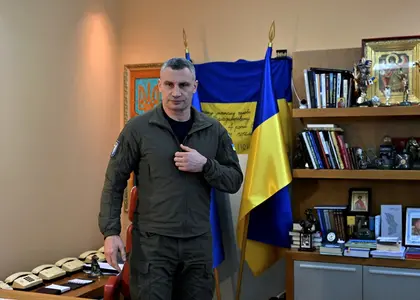Russian forces have, in recent days, made small but significant gains right along the border in the Kharkiv region. Their advances are only a few miles deep but have swallowed up around 100km (62 miles) of Ukrainian territory. In the more heavily defended east of Ukraine, it’s taken Russia months to achieve the same. Commander of a Ukrainian Special Reconnaissance Unit, Denys, wants to know what happened to Ukraine’s defences. “There was no first line of defence. We saw it. The Russians just walked in. They just walked in, without any mined fields” he says. He shows me video from a drone feed taken a few days ago of small columns of Russian troops simply walking across the border, unopposed. He says officials had claimed that defences were being built at huge cost, but in his view, those defences simply weren’t there. “Either it was an act of negligence, or corruption. It wasn’t a failure. It was a betrayal”. - BBC
Russia is blaming a Ukrainian strike after an entire section of an apartment building collapsed following an explosion in Belgorod. CCTV from the scene shows a large blast near the base of the 10-storey block and then the building falling in. The regional governor said two bodies had been pulled from the rubble. At least 19 people have been injured. The Russian city is near the border with Kharkiv in Ukraine, where Moscow's troops launched an offensive on Friday. The Belgorod region has often been targeted by Ukrainian forces since the start of Russia's full-scale invasion of Ukraine in 2022, but previously Ukrainian officials have said cross-border strikes do not target civilians.

EU Proposes Cutting 15 Russian Banks From SWIFT in New Sanctions Package
JOIN US ON TELEGRAM
Follow our coverage of the war on the @Kyivpost_official.
U.N. agencies are warning that humanitarian operations throughout the Gaza Strip will cease within a matter of days if Israel does not reopen border crossings and allow critical fuel supplies to enter the Palestinian territory. “For five days, no fuel and virtually no humanitarian aid entered the Gaza Strip, and we are scraping the bottom of the barrel,” Hamish Young, UNICEF’s senior emergency coordinator in the Gaza Strip said Friday. Speaking from Rafah, Young told journalists in Geneva that “This is already a huge issue for the population and for all humanitarian actors but in a matter of days, if not corrected, the lack of fuel could grind humanitarian operations to a halt. The UNICEF official said that he has been working on large-scale humanitarian emergencies for the last 30 years but that he has “never been involved in a situation as devastating, complex or erratic as this…When I arrived in Gaza in the middle of November, I was shocked by the severity of the impact of this conflict on children and, impossibly, it has continued to worsen,” he said. - RFE/RL
At least 48 people have been detained in Yerevan for disobeying police orders as protests calling for the resignation of Armenian Prime Minister Nikol Pashinian continue following word of a land deal last month with arch foe Azerbaijan, with more demonstrations planned for May 12. The Interior Ministry on May 11 confirmed the latest detentions as police tried to clear streets in the capital clogged with demonstrators. Protest leader Archbishop Bagrat Galstanian, who called on supporters to block street traffic on May 11, has said the next rally in Yerevan's central Republic Square would begin at 6:30 p.m. on May 12. Galstanian said he would update his supporters on further actions during the May 12 rally. Yerevan and Baku preliminarily agreed on a protocol signed on April 19 in which Armenia cedes control of four villages controlled by Yerevan since the 1990s.
Switzerland has won this year's Eurovision Song Contest. Swiss rapper and singer Nemo's song "The Code" impressed both the jury and the public at the popular annual event, held Saturday in Malmö, Sweden. “It is the most insane thing that has ever happened to me," the 24-year-old vocalist said at the post-event press conference. "The Code" explores the artist's nonbinary identity in a flamboyant mashup of opera, rap, drum-and-bass and electronic dance music. Nemo was one one of two nonbinary singers to compete in the Eurovision Grand Finals this year, along with Ireland's Bambie Thug. - NPR
You can also highlight the text and press Ctrl + Enter










